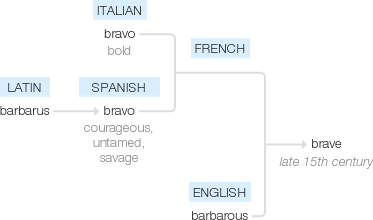Brave
late 15th century: from French, from Italian bravo ‘bold’ or Spanish bravo ‘courageous, untamed, savage’, based on Latin barbarus (see barbarous).
wiktionary
From Middle French brave, borrowed from Italian bravo, itself of uncertain origin (see there).
etymonline
brave (adj.)
"exhibiting courage or courageous endurance," late 15c., from French brave, "splendid, valiant," from Italian bravo "brave, bold," originally "wild, savage," a word of uncertain origin. Possibly from Medieval Latin bravus "cutthroat, villain," from Latin pravus "crooked, depraved;" a less likely etymology being from Latin barbarus (see barbarous). A Celtic origin (Irish breagh, Cornish bray) also has been suggested, and there may be a confusion of two or more words. Related: Bravely.
Old English words for this, some with overtones of "rashness," included modig (now "moody"), beald ("bold"), cene ("keen"), dyrstig ("daring"). Brave new world is from the title of Aldous Huxley's 1932 satirical utopian novel; he lifted the phrase from Shakespeare ("Tempest" v.i.183).
brave (v.)
"to face with bravery," 1761, from French braver, from brave "valiant" (see brave (adj.)). Related: Braved; braving.
brave (n.)
"North American Indian warrior," 1827, from brave (adj.). Earlier "a hector, a bully" (1590s); "brave, bold, or daring person" (c. 1600). Compare bravado, bravo.
